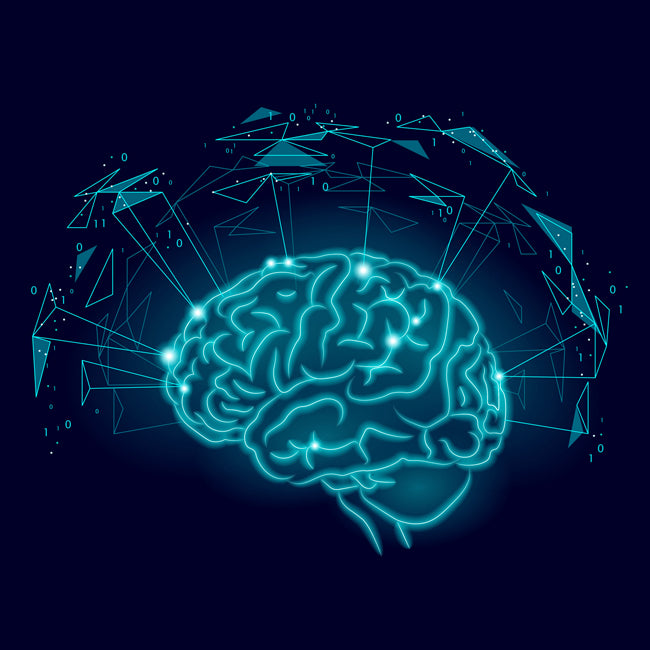
GABA | The Brain-Boosting, Anxiety-Busting Power House!
July 15, 2018
GABA Uses and Benefits
- Relieves Anxiety
- Improves Sleep
- Reduces Depression Symptoms
- Relieves Symptoms of PMS
- Decreases Inflammation
- Improves Focus in ADHD
- Increases Levels of Growth Hormone
1. Relieves Anxiety
One of the main functions of GABA is to reduce nerve excitability, which could be linked to feelings of anxiety and fear. This is because it has a calming effect and is often used as a natural remedy for anxiety. In fact, certain anxiety disorders have even been associated with decreased levels of GABA.
A study in the American Journal of Psychiatry found that those with panic disorder, a type of anxiety disorder characterized by recurring panic attacks, had an impaired GABA response. Another study from the Columbia University College of Physicians and Surgeons’ Department of Psychiatry showed that those with panic disorder and a family history of mood and anxiety disorders had decreased brain concentrations of GABA.
In addition to GABA, there are many other natural remedies for anxiety available, such as meditation, essential oils or valerian root, an herb that helps increase levels of GABA to inhibit nerve activity.
2. Improves Sleep
Insomnia is a condition characterized by difficulty falling asleep that affects an estimated 30 percent of adults worldwide. GABA has a calming, sedative effect and may be able to help naturally induce sleep by reducing nerve excitability.
One 2015 study found that taking GABA helped participants fall asleep quickly, shortening the amount of time it took to fall asleep by an average of five minutes. Additionally, those with insomnia may actually have lower levels of GABA. A 2008 study in the journal Sleep found that patients with insomnia had 30 percent lower levels compared to a control group.
Besides using GABA for sleep, maintaining a regular sleep schedule, limiting your caffeine intake and taking magnesium to help promote GABA function can all also encourage better sleep.
3. Reduces Depression
In addition to preventing anxiety and regulating sleep, the GABA neurotransmitter is also thought to play a central role in depression. Research has found that people with depression tend to have lower levels of GABA than those without depression.
GABA levels may also increase after depression is treated. One study from the Department of Psychiatry at the Yale University School of Medicine showed that patients who underwent electroconvulsive therapy for their depression exhibited increased levels of GABA following treatment. Thanks to its antidepressant effect, GABA may be a good alternative to traditional treatments for depression.
Other natural remedies for depression include modifying your diet, getting in plenty of exercise and making sure you’re meeting your vitamin D needs.
4. Relieves Symptoms of PMS
Premenstrual syndrome, or PMS, is a group of symptoms like mood swings, fatigue and food cravings that occur in women between ovulation and the start of menstrual bleeding. Studies show that GABA levels are disrupted by menstruation and may decline across the menstrual cycle.
This neurotransmitter may be able to help provide relief from symptoms of PMS. For example, some studies have suggested that it could act as an a natural pain reliever while others have noted that it could be involved in the mechanism of cramps.
Chasteberry, vitamin B6 and magnesium are also natural remedies for PMS that can help balance hormones and reduce symptoms.
5. Decreases Inflammation
Although inflammation is a normal response triggered by the immune system as a result of illness or injury, chronic inflammation can contribute to diseases like cancer, heart disease and even arthritis. Some research has found that GABA could help decrease inflammation and may be useful in the treatment of these conditions.
An animal study from UCLA, for instance, found that supplementing mice with GABA reduced the risk of developing rheumatoid arthritis and decreased symptoms for those that did. Another review in the Journal of Neuroinflammation suggested that GABA could reduce the activity of a pathway that triggers joint inflammation.
Filling your diet with anti-inflammatory foods can also help lower inflammation. Leafy green vegetables, berries, salmon and walnuts are all inflammation-busting foods that can be useful in addition to GABA.
6. Improves Focus in Attention Deficit Hyperactivity Disorder
Attention deficit hyperactivity disorder, commonly known as ADHD, is a condition that affects both children and adults and can cause symptoms like limited attention, impulsivity and hyperactivity. GABA is sometimes used to improve focus and decrease symptoms in individuals who have attention deficit hyperactivity disorder.
A 2012 study out of the Johns Hopkins University School of Medicine compared concentrations of GABA in children with and without ADHD and found that children with ADHD had reduced concentrations in the brain. Another study showed that lower levels of GABA were associated with more impulsivity and less inhibition.
Taking a GABA supplement, alone or in conjunction with traditional treatments, may help lessen symptoms of ADD and ADHD naturally. Following an ADHD diet and using other natural remedies for ADHD may also be effective in helping to reduce symptoms.
7. Increases Levels of Growth Hormone
Human growth hormone is a hormone produced in the pituitary gland that comes with benefits like increased muscle strength, a lower risk of heart disease, improved body composition and stronger bones. A deficiency in this essential hormone can lead to symptoms like delayed puberty and slowed growth in children as well as depression, sexual dysfunction, insulin resistance and an increased risk of heart disease in adults.
Studies show that supplementation with GABA may increase levels of human growth hormone. A 2008 study supplemented 11 men with either three grams of GABA or a placebo, which was followed by rest or resistance training. Following supplementation with GABA, participants saw up to a 400 percent increase in levels of human growth hormone.
High-intensity exercise along with other supplements, such as L-glutamine and L-arginine, can also help naturally increase levels of growth hormone.
Posted in News By Element Nutraceuticals


